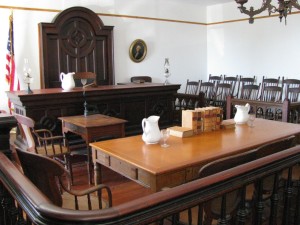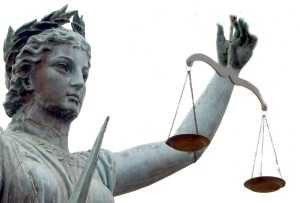Let me begin with a disclaimer. This is not a political article, but it was prompted by some political news. Earlier today, I was reading an article about the litigation Donald Trump currently has on his plate. Mr. Trump is currently involved in 75 active lawsuits ranging from spats with pageant contestants to allegations of fraud to multi-million dollar real estate lawsuits. But, it was not the number of lawsuits that prompted this post, because in fairness, there are companies with larger litigation dockets. Instead, what caught my attention was this portion of the article:
Articles Posted in Litigation Process
What Hillary Clinton’s Pneumonia Teaches Us
Now wait just a minute, I am not going to talk politics. I am going to talk about disclosure and hindsight. Whatever your opinion on Hillary Clinton, most people think it was a mistake for her not to have disclosed that she was suffering with pneumonia. Day in and day out, we counsel our clients on disclosure and here are some thoughts on the issue:
- What you think is important is not what everyone else thinks is important. HRC said she did not disclose the pneumonia because she did not think it was a big deal. But, she is not the decider of what is a big deal in an election. That is the voters’ job. The same is true of litigation: the ultimate decider is the jury. So we tell our clients that everything needs to be viewed through the eyes of jurors.
- Non-disclosure almost always does more harm than disclosure. Because some hubbub had already been made about her health, HRC probably thought it would be better keep her pneumonia diagnosis to herself and her camp, take some antibiotics, solider on and avoid providing any fodder to Trump, the media, etc. This is not an unreasonable position on its face. The problem comes when the information comes out anyway. With HRC, her stumble or collapse (depending upon your political affiliation) outed her illness. As a result, the focus is now two-fold: her health and her transparency. The same is true in injury litigation. Let’s say you have a prior back injury that you think is unrelated to the current back injury you received in a recent tractor-trailer accident and so you decide not to tell your lawyer or the other side about it when they ask you under oath. Let me be clear: this is a horrible plan. The other side is going to have full access to your medical and pharmacy records and the power of a subpoena. Defense lawyers get paid a lot of money by the hour to find things that hurt your case. A good defense lawyer will leave no stone unturned and when they find it you, just like HRC, will have two problems: the old injury is now known and your non-disclosure has now also created a credibility or transparency issue for the jury. Recall point 1; the jury gets to decide what is important and if you win.
Fundamentals Win Games and Lawsuits
Almost any coach will tell you that fundamentals win games. While lawsuits are definitely not a game, they are about winning. So just as a good baseball coach will instruct you to field a grounder with your glove on the ground and your bare hand above the glove, we want to tell you four fundamentals you can do to help win your lawsuit. Continue reading
As Tay Tay says: “All You Are Ever Going To Be Is Mean”
I know you may think this article is about politics and it surely could be. The rhetoric in this election year has been meaner and uglier than I can remember. But, I am talking about lawyers. While mean is not the quality anyone is usually looking for in leaders, family or friends, contrary to a lot of folks popular belief, it is also not the quality you should be seeking in a lawyer. Let me explain. Continue reading
Trying To Be Cheap When Purchasing Insurance Could Cost You
Last week, a question was posted on Avvo (a legal Q & A site) seeking advice about what should be done following a car accident. The questioner was worried about getting sued, and the primary source of his anxiety was because he had substantial assets including investment accounts but he only had $100,000 in automotive insurance coverage. In particular, he wanted to know if he should hire his own lawyer separate and apart from any lawyer hired by his insurance company? Before I get to that, let me start with something more important. Continue reading
Make Me A Witness
A few weeks ago, I received a voicemail from a lawyer indicating he would like me to be a witness in a case and wanted to talk to me about my recollections surrounding the event at issue. I will confess my response was to cringe a little. As a trial lawyer, I am intimately familiar with the litigation process so nervousness about the process, etc. was not the issue as it understandably is with some who get a subpoena. Instead, my cringing had more to do with the time involved in being a witness and getting involved in a conflict with folks that I happen to know. But once the cringe moment passed, I realized this was an opportunity similar to the one I received when I was called for jury duty. It was an opportunity for me to be reminded of what it is like to be a part of litigation in a role other than as a lawyer.
So I thought it might be helpful to write a few posts about the overall process of being a witness in hopes it might be helpful to others in the same situation. Let’s start with the cardinal rule: any trial lawyer worth his or her salt does not want you to testify at a trial without knowing what you intend to say. So that only leaves a few options. Continue reading
I Signed A Sports/Liability Waiver for My Kid. Is It Valid?
Whether your kid is involved in softball, baseball, basketball, gymnastics, soccer, football, cheerleading or other type of sport, the registration process almost certainly included a sports or liability waiver. Typically, the parent or guardian is asked to release the organization, coaches, etc. from any claims arising from their child’s participation. And, because the waivers are presented as a take-it or leave-it, negotiation is not an option. So, you sign it. And then, the worst happens: your child gets injured. What do you do next? Continue reading
Five Things You Can Do To Improve Your Credibility in Litigation and in Life
I have been following the prep school rape trial involving Owen Labrie. Mr. Labrie stands accused of raping a 15 year-old girl as part of a ritual known as Senior Salute at St Paul’s School. Mr. Labrie claims he had consensual sexual contact with the accuser but denies having sexual intercourse. The accuser claims she twice told Mr. Labrie “no” but he persisted and ultimately raped her.
Throughout the trial, and especially in closing arguments, the credibility of the accused and accuser were front and center. While there was some other evidence including texts, Facebook messages, lists of girls Mr. Labrie was pursuing, etc., the reality is, like so many cases, this trial is largely a “he said” v. “she said”. In litigation, as in life, there are some key things you can do to maintain your credibility. So here are 5 crediblity boosters for life and litgation. Continue reading
Pina Coladas and Ashley Madison
Remember the old song? Escape by Rupert Holmes. The guy is lounging in bed with his significant other and reading the personal columns. He notices one that catches his eye and, because he is in a rut in his relationship, he responds. A meeting is set up, and when he shows up at the appointed time, it turns out that it was his girlfriend who he intended to cheat on had actually placed the ad. She appears at the rendezvous not knowing it was her lover who had responded and is equally, but happily, surprised: “they laugh for a moment and I said I never knew that you like Pina coladas and getting caught in the rain . . .” A happy ending; all is well.
Today, most folks looking to cheat in their relationship apparently don’t use the personal columns but instead 32 million of them turned to Ashley Madison. And after the hack of the company’s website, spouses around the globe are checking to see if their spouse was a user of the site. Doubtful there will be any happy endings. In fact, divorce lawyers are seeing an uptick in business. Continue reading
Just Telling It Like It Is
Recently, we were contacted by a woman who had sustained a broken elbow in an accident. She called our office and we reviewed her accident and her legal options with her. Given the circumstances of her accident, we told her we did not think we would be able to help her. But, we gave her some advice on what she could do to, at least, get the company to pay her medical bills. We later heard back from this woman who expressed her gratitude for us spending the time to talk to her and helping her find a way to get reimbursed for her medical bills. She ended her email by saying we had reshaped her opinion of personal injury lawyers.
Personal injury lawyers do get a bad name as ambulance chasers, sharks, etc. And to a large extent, some of our brethren have brought this on through a variety of practices including taking on too many cases causing them to neglect clients, airing tacky commercials with such catchy phrases as: “turn your wreck into a check”, unethically pursuing injury victims, etc. I could go on but I think you know the conduct to which I am referring. Continue reading
 Tennessee Injury Law Center
Tennessee Injury Law Center










